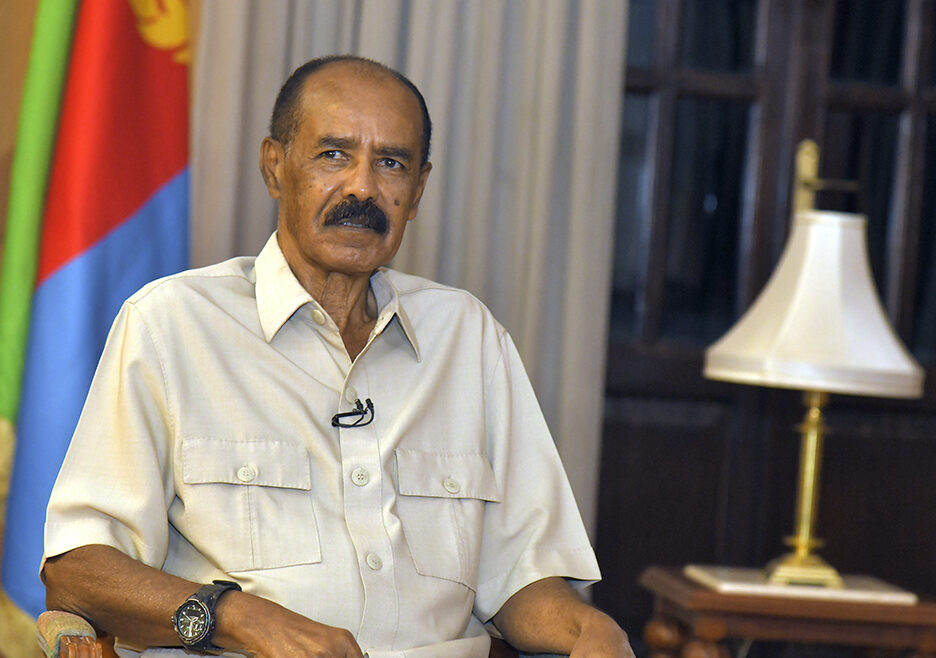As Ethiopia Escalates, President Isaias of Eritrea Warns of Reckless Adventurism Threatening Regional Peace

In a stark warning that underscores rising tensions in the Horn of Africa, President Isaias Afwerki of Eritrea has sharply criticized the Ethiopian government’s “infantile” provocations and veiled war preparations, accusing Prime Minister Abiy Ahmed’s administration of dangerously stoking conflict under the guise of sovereign grievances.
During an in-depth interview with local media, President Isaias laid bare the growing alarm in Asmara over what he described as a series of “cheap lies,” erratic behavior, and foreign-influenced agendas emanating from Addis Ababa.
His remarks come days after the Ethiopian government submitted a letter to the UN Secretary-General accusing Eritrea of destabilizing the region — an allegation the Eritrean President dismissed as “astounding and infantile.”
“This was indeed a cheap lie by the Prosperity Party to cover up its war preparations,” President Isaias stated, adding that the accusations were not only baseless but intended to mask Ethiopia’s own internal disintegration and geopolitical gambling.
A Dangerous Distraction from Domestic Collapse
The President highlighted Ethiopia’s spiraling internal crises — from rampant ethnic violence to the regime’s failed implementation of the Pretoria Agreement — as evidence that the Prosperity Party is looking outward to deflect from its own failures.
“The turmoil we see in Ethiopia today is really unprecedented,” he warned. “Why is the Prosperity Party agitating for war against Eritrea instead of addressing its domestic problems?”
The Eritrean leader questioned why the Ethiopian government had chosen to unleash a campaign against the FANO militia rather than pursuing peace and reconciliation. He lamented the wasted opportunity for lasting regional cooperation after the 2018 peace declaration, saying that Eritrea had earnestly hoped for a “solid and bilateral relationship” with its neighbor.
Weapons, War Talk, and the Specter of Foreign Agendas
One of the most pointed moments in the interview came as President Isaias called out the Ethiopian regime’s recent arms purchases and bellicose rhetoric. He warned that Addis Ababa’s “bragging” about drones, long-range missiles, and tanks signals a clear war agenda — one he says is being encouraged by external powers.
“They claim they have tacit endorsement from France, the US, and the UAE to their war agenda; but this is not entirely true,” he said. “How can anyone accuse Eritrea while procuring weapons and resorting to daily saber-rattling?”
He went on to describe the Prosperity Party’s “access to the sea” campaign as both a smokescreen and a geopolitical fantasy.
“The gimmick of ‘sovereign access to the sea’ has other geopolitical dimensions. Other powers are evidently behind this reckless adventure,” the President said, explicitly pointing to the UAE’s ambition to control a network of regional ports as one of the driving forces behind the push.
In an act of regional solidarity, President Isaias disclosed that Eritrea had rejected Ethiopia’s past proposal to reroute all of its imports through Assab — a move that would have financially crippled Djibouti.
“We told them that we would not contemplate such a scheme to harm a neighboring country, that’s haram” he emphasized.
No Appetite for War, But History Has Taught Preparedness
Despite the gravity of the accusations against Ethiopia, President Isaias reaffirmed Eritrea’s longstanding position: peace is the priority, but national defense is non-negotiable.
“We have no appetite for war. But we have fought imposed wars,” he stated. “We have no territorial claims or ambitions against our neighbors. But as history attests, we know how to defend our country when and if attacked.”
He called on the Ethiopian people and neighboring countries to “take stock of the situation” before it spirals further. At the same time, he underscored Eritrea’s readiness to respond should aggression be forced upon it.
“This is mind-boggling and can only be entertained by those who do not know history,” he said in reference to Ethiopia’s growing military bravado.
Africa Must Own Its Sovereignty — Not Rent It Out
Zooming out to the global context, President Isaias touched on the collapse of the U.S.-led unipolar world order and the opportunity this presents for African states to assert their independence and redefine their developmental trajectory.
“Africa must extricate itself from debilitating dependency… It has huge resources, but remains handicapped by a primitive economy,” he remarked. “This must change.”
He decried the proliferation of foreign-backed NGOs, brain drain, and shallow institutional replicas, urging Africans to create systems that reflect their own realities.
In a sharp rebuke of Western interference and misguided foreign policy toward Eritrea, President Isaias reiterated Eritrea’s willingness to engage constructively with the United States — but only on the basis of mutual respect and regional synergy.
“We do not ask for favors,” he stated. “The objective remains the remedial of misguided policies that affect the region negatively.”
The Path Forward: Caution, Readiness, and Regional Unity
Despite ongoing provocations, Eritrea remains committed to regional integration and peace, the President affirmed. While skeptical of IGAD and AU track records, he insisted that Africa’s shared interests and interconnectedness must not be sacrificed at the altar of foreign manipulation or internal recklessness.
“External interference often undermines these efforts,” he said, “but we must exert vigorous efforts to advance regional cooperation.”
As tensions rise, the question remains whether Ethiopia’s leadership will pull back from the brink — or plunge the region into another needless and destructive conflict. One thing is clear from Asmara’s vantage point: Eritrea will not be the aggressor. But it will not be caught unprepared either.

